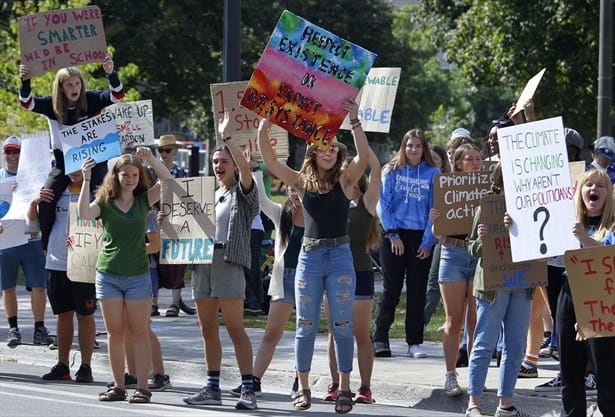Last week I looked at the scientific facts about the climate crisis – a problem that will prove to be far worse than the pandemic. This week I’d like to turn to the solutions. Here’s the challenge: According to the Intergovernmental Panel on Climate Change, in order to avoid catastrophic impacts, warming must be limited to less than 2°C and preferably no more than 1.5°C. This will mean reducing emissions (which are still rising) by 45% by 2030 and 100% by 2050.
Like all parents and grandparents, the bottom line for me is wanting my kids and grandchildren to have a beautiful, unbroken planet in which they can live their hopes and dreams.
What needs to be done?
We must:
- Change everything in the modern economy that produces emissions. Although nearly all of the solutions exist now, getting to 100% will require a massive increase in government funding for research on innovative technologies.
- Confront the climate crisis head-on, with determination and “stubborn optimism”.
- Stop destroying ecosystems that absorb carbon, and embark upon a huge ecosystem restoration effort. This includes planting billions of trees around the world.
- Remember that the fight for climate solutions is inextricably linked to the fight for racial justice and inequality in general.
- Green the entire energy sector through the use of wind, solar, geothermal, hydrogen, biofuels, and, in the opinion of many experts, the new generation of nuclear plants.
- Embrace electric vehicles and self-driving cars, but also find solutions for green trucking, shipping, flying, and heavy industry.
- Move to “regenerative farming” which allows for the absorption of much more carbon and traps it in the ground. This includes no-till practices and planting cover crops.
- Assure that next November’s UN Climate Change Conference (COP26) is successful in getting countries to sign on for more ambitious goals in reducing emissions.
- Get people engaged with climate change through the arts and music. We under-estimate how much impact they have.
- In the longer term, disabuse ourselves of the myth of sustainable development and create an economy that redefines growth; focuses on positive society-wide benefits; and allows humanity to thrive without destroying the Earth’s living systems.
Personal action


- Despite the fact that many people think, “What can I do? Little old me alone in the world against such a huge problem,” there is lots that an individual can do. The key, however, is focusing on collective solutions. Changes in personal lifestyle help but are not sufficient, given the size of the problem and the tiny window of time to act.
- Sadly, there’s a lack of public engagement with climate change, including not putting enough pressure on politicians to act. I’ll delve deeper into this in March, based mainly on the feedback I receive from readers and Facebook friends. See today’s sidebar.
- One person CAN make a difference. Among the most powerful actions are: 1. Talking about climate change with friends and family by focusing on emotions (instead of simply climate facts), shared values, and collective solutions. Don’t dwell on personal lifestyle changes and never shame people. Share your concerns and solutions on social media, but don’t waste time engaging with climate deniers, now a tiny part of the population. You could even organize a Climate Book Club (book suggestions below); 2. Write or phone local politicians to demand more community action. 3. Join or donate to a group fighting for change, including those working on poverty and inequality. 4. Set an example where you can, especially around eating a more plant-based diet; 5. Go to https://forourgrandchildren.ca/ and subscribe to the newsletter to find ways to amplify your voice; and 6. Vote with climate front of mind.
- Send a message to your kids and grandkids about the kind of future you desire. Go to http://toallourrelatives.ca/ and click on “Messaging”. This is a Peterborough initiative.
- Engage more with nature. It’s good for you, and it provides a strong incentive to take action if we’re to protect all that stands to be lost in the natural world.

Progress to date
- There are many reasons for hope. We have seen huge momentum on action in the last two years. This is happening to a large extent thanks to the leadership of young people like Greta Thunberg and the Youth Mobilization to Stop Climate Change movement. And, if President Biden’s is successful in making most of his climate agenda a reality, this will be a global game changer.
- Here are some encouraging facts: The market share of electric vehicles in Norway is now over 50%; wind and solar are poised to supply 70% of new power plant capacity this year in the U.S.; Airbus is developing a zero-emission commercial aircraft; Lafarge Canada has introduced concrete with 30 to 100% less carbon emissions than standard concrete.
- More politicians are taking or at least promising action than ever before. These include Justin Trudeau (promising a much more aggressive carbon tax – an essential tool in driving change), Joe Biden (decarbonizing the U.S. electricity grid by 2035), Chinese leader Xi Jinping (net-zero emissions by 2060), New Zealand prime minister Jacinda Arden (carbon neutral by 2025), and Urula von der Leyen of the European Commission (55% reduction of emissions in Europe) by 2030).
- Many solutions around transportation and more walkable spaces are already being implemented at the city level. Some of the best examples are New York City, Paris, and Montreal. It’s important to recognize the impressive leadership of women mayors like Valerie Plante (Montreal) and Anne Hidalgo (Paris).
- Many corporations have committed to unprecedented action. Among the international leaders is the corporate giant Unilever, which aims to use 100% renewable energy in all its operations by 2030. General Motors has now promised to completely phase out vehicles using internal combustion engines by 2035.



- In Canada, Maple Leaf Foods is the only food company in the country to set Science Based Targets that are aligned with the goals of the Paris Climate Agreement. In 2019, it became the first major food company in the world to be carbon neutral. In the U.S., Beyond Meat and Impossible Foods are now making plant-based “meats” which are indistinguishable from the real thing.
- The investment and finance sectors are stepping up, too. Brookfield, a Canadian investment firm, plans to raise at least $7.5 billion for a new climate-focused fund. Former Bank of Canada governor Mark Carney will oversee the fund, along with Brookfield’s ESG (Environmental, Social, and Governance) practices. The world’s largest investor, Blackrock, which manages $7 trillion in assets, is making climate change central to its investment strategy for 2021. This may lead to a fundamental reshaping of global finance.
- Multiple studies have now shown that producing more renewable energy and retrofitting houses for energy efficiency creates more jobs than those lost from coming off fossil fuels.
- On the local level, many groups and businesses are engaged with finding solutions. Among these are For Our Grandchildren, Transition Town Peterborough, Peterborough Alliance for Climate Action, Peterborough GreenUp, Youth Leadership in Sustainability, Sustainable Peterborough, Peterborough Youth Empowerment, Random Acts of Green (check out their wonderful app), Camp Kawartha, and the Endeavour Centre.
- Peterborough declared a Climate Emergency in 2019, thanks largely to the efforts of local youth activists like Nico Ossa-Williams. We’re still waiting, however, for meaningful action on Council’s part.
- Malaika Collette, a grade 12 student from Peterborough, helped organize the “Mock COP26 on Climate Change” (over Zoom) which engaged youth activists from 142 countries.

Lessons from Covid
- Covid has taught us to trust science, work for the common good, address inequality, and appreciate the central role of government in delivering solutions. It sets us up well for what we have to do on the climate crisis.
- We’ve seen that when a government gets into “emergency mode”, it’s capable of spending whatever needs to be spent; it moves from voluntary to mandatory measures; and tells the truth about what we’re up against.
- Most governments in Canada have done all three of these things. However, Ottawa has only begun to act on most of them, despite the climate emergency declaration.
Best resources
- Podcasts: Outrage and Optimism; How to Save a Planet; What on Earth
- Websites: www.dailyclimate.org; www.climatecentral.org; https://www.theguardian.com (environment news); https://forourgrandchildren.ca/ (lots of resources for taking action).
- Facebook: www.facebook.com/forourgrandchildren/
- Books: My favourite is “The Future We Choose“ (Christiana Figueres and Tom Rivett-Carnac). It’s a great introduction to climate change and is full of hope. I also recommend “Drawdown“ (Paul Hawken), “Commanding Hope“ (Thomas Homer-Dixon), “A Good War: Mobilizing Canada“ (Seth Klein), “All We Can Save“ (Ayana Elizabeth Johnson with contributions from over 50 female climate leaders), and “The Ministry For The Future: A novel“ (Kim Robinson).
- YouTube: Canadian scientist Katharine Hayhoe “The most important thing you can do to fight climate change: talk about it” at https://bit.ly/3do8oqq




A SPECIAL REQUEST
It has long puzzled me why few people ever comment on what I write on climate change. Many people email or call me about my general nature columns – something I’m always grateful for – but almost never so when it comes to climate, outside of local activists. The same silence happens on Facebook where I regularly post on this topic. Those of us in the climate movement wonder why our voices seem to fall on deaf ears. I’d appreciate knowing your thoughts on why this might be. Is it indifference? Too depressing a topic? Feeling helpless as to how to take action? I plan on doing a column next month on the reasons for this lack of engagement, based on the insights I receive. The response to this same question on Facebook was extraordinary. You can email me at dmonkman1@cogeco.ca